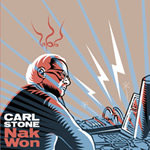|
|
 |
Dusted Reviews
Artist: Carl Stone Album: Nak Won Label: Sonore Review date: Sep. 17, 2003 |

|
|
|
 |
Composer Carl Stone studied with Morton Subotnick and James Tenney at the California Institute for the Arts, and has written mostly electronic music since the early 1970s. He later became one of the first "new music" types to use samplers.
Fortunately, unlike many university-trained electroacoustic composers, Stone doesn't treat electronics like acoustic instruments, and he doesn't adhere to progammatic approaches to form, preferring instead to revel in sound for its own sake. His long, dense pieces are often similar in spirit to the electroacoustic experimentalists of the 1960s, even though the sounds Stone uses feel contemporary and he occasionally includes bits of Tigerbeat 6-style fun.
Nak Won consists of real-time Powerbook performances recorded in San Francisco and Los Angeles. One of its most striking traits is its diversity. The title track begins with an abrasive sine-wave drone that eventually divides and shoots into one's listening space in every possible direction, the way a Ryoji Ikeda experiment might. "Kreutz" is the shortest and most conventional work here, but it's also the most affecting. It''s a lovely ambient piece that's based on surprisingly consonant and unassuming echoing chords. "Darul Kabap," on the other hand, samples from several types of non-western music for its first ten minutes before bringing samples of an Indian singer into focus. Gradually, the last ten minutes become a Kid 606-style percussive cut-up that threatens to become a 130-bpm techno track.
It's these last ten minutes that intrigue me most, and not because they're the best part of Nak Won (they're not). Stone has been making electroacoustic music for thirty years, and some of his early training came in an academic setting. He could easily have tenure and be teaching C-Sound classes now. He could also be ignoring all electronic music that doesn't come from the academy.
Plenty of interesting music comes from people with academic backgrounds, of course. But it seems that nearly all of the most progressive, newest-sounding electronic music today comes from people who haven't studied music at universities. Nak Won is a welcome exception. The album demonstrates that Stone has learned not only from great avant-garde composers of the past (Subotnick, La Monte Young, Iannis Xenakis), but also from contemporary artists (Kid 606, Fennesz, Ekkehard Ehlers) whose work has thus far mostly reached a decidedly younger fanbase.
By Charlie Wilmoth
|







